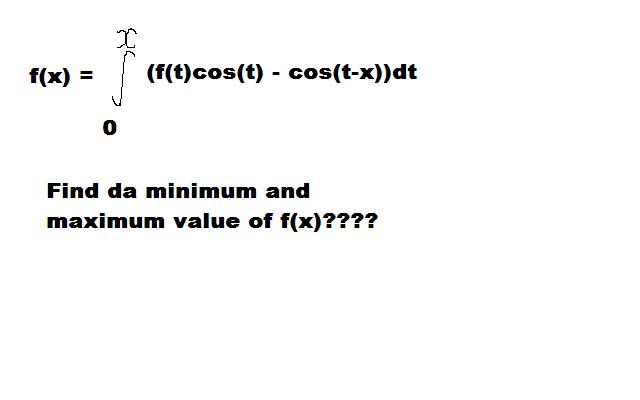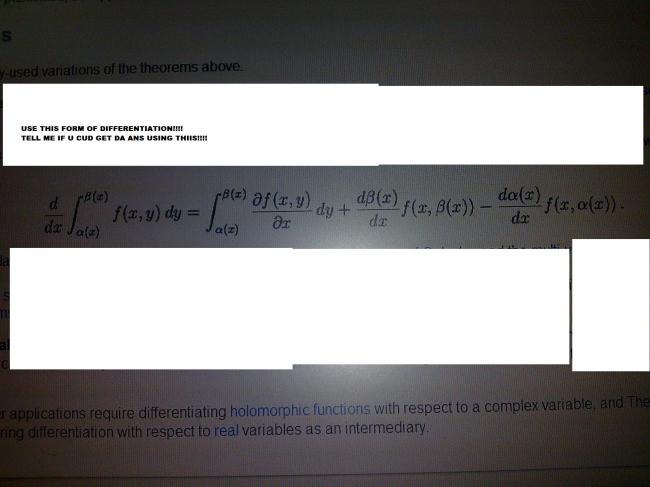for maxima minima or for alll points
f(x) is a differentiable function satisfying the following relation :

-
UP 0 DOWN 0 1 33

33 Answers
after getting f(x)=secx for maxima minima points
substitute it in the question and integrate i am getting another f(x) there
maybe we can check that function for maxima and minima again[7]
hey i think itz -cosx or secx im i rite.........i thinked in another manner
GUYZ DA FINAL ANSWER FOR MAX. IS 1-e and for min 1 - e^-1
does anyone of u get it using y=sec(x)???????????????
i think some thing much more be mention for finite value but if not mentioned then i got min. as -∞ & max. as +∞ i m write plz reply
YEAH!!!!!!!!1
GOT IT!!!!!
JUS USE DA ABOVE FORMULA TO DIFFERENTIATE!!!!
THEN U GET A DIFF EQN.
WHICH ON SOLVIN GIVES Y = 1-e^sinx
therefore min max r 1-e^-1 and 1-e.....
CREDIT GOES 2 CELESTINE!!!!!!!!!
THNX A TON CELE!!!!!
Does this have something to do with the Newton-Leibnitz theorem?
heyyy...... not this way..
this is a differential eqn... in linear form..
dy/dx - ycosx = -1
p(x) = -cosx
find integrating factor : e∫pdx n then do all those traditional works....
But how will you integrate???
u'll get f(x) = ∫f(x)cosx - x + c
wat alll operations can u do on this f(x) to get da maxima??
This que was a more than one correct ans type que. and both the max. min. wer part of the rite answers!!!!!!
yes i think i got it...
f'(x) = f(x)cosx - 1 .
now integrate.
we will find f(x) .
then we can do all operations on f(x).
the for min value is 1-e
and for max value is 1 - (1/e)
secx = f(x) at max/min does not solve the prob ne.....
try this out by differentiatin n then making a differential equation.
looks a tough nut to crack...
CMON PPL.....
AB TO ANS KI HINT BHI DE DI......
PLZZZ.... GIVE ME SUM IMPORTANT BREAKTHROUGH
MAK!!!!
U cant apply uv rule n solve coz still f(x) or f'(x) (whichever u take as v) remains which is not integreable!!!!!
the ans is in terms of e....
plzzz tell notify me if ne1 gets it
i didn't solve it clearly... let aatmanvora try it again... if he doesn't get, then lets solve it...
if v solve it completely n provide it to him... that would be as worst as spoon-feeding... [6] [4]
